- Home
- Andrew McGahan
Underground Page 11
Underground Read online
Page 11
‘Do they know who you’ve got in here?’
‘Of course not. And they won’t come looking either. We just said we needed a box for the day, and here it is.’
I had a sudden vision of our transport arrangement out of Brisbane. We would be travelling with the Australian cricket team itself, on their team bus. (They used to fly, but not anymore. Too much of a risk for the national morale, if their plane happened to be one that got taken down by terrorists.) I would be sitting next to the Australian captain himself, and we would discuss batting averages and rebellion as we headed south.
But the fantasy vanished abruptly. I was gazing at the big video scoreboard. It had been showing the usual advertisements, but suddenly Aisha’s face was staring back at me across the stadium, thirty feet high. I lurched up out of my chair in alarm. Was there a camera on us somewhere?
Harry’s hand was on my arm. ‘Don’t panic. It’s just the wanted posters.’
He was right. For a start, it was Aisha’s old face up there on the screen, the long white hair, the crazy eyes. It looked nothing like she did now. And then it was replaced by another face—a man, no one I knew. And then more faces after that. All with their names emblazoned below, along with the words ‘Wanted for crimes against the Commonwealth’. By that time I was sitting down again, heart thumping in relief. And studying the crowd, I could see that no one was paying attention anyway. This was standard stuff at sports venues now, and it always drew about as much attention from the fans as wallpaper.
I drained my beer, and got another.
Out on the ground, the teams had withdrawn to the dressing rooms, and now a US military marching band was doing some laps.
‘Marching bands,’ Harry observed. ‘At the cricket. Honestly, they’ve probably brought bloody cheerleaders along as well.’
Meanwhile, ground staff were erecting a microphone near the pitch. The marching band worked its way over to it, then the two teams trooped back out and lined up on either side. ‘Ladies and gentlemen,’ came an announcement over the ground PA, ‘please be upstanding for the national anthems.’
As one, the crowd, Australians and Americans alike, rose and put their hands to their hearts. An African American soldier in dress uniform approached the microphone and, in a quite decent baritone, embarked upon ‘Oh say, can you see . . .’
‘Oh God.’ Harry was completely disgusted now, rising from his seat. ‘Excuse me while I take a piss, will you? I can’t bear this at the cricket.’
He vanished through the door. Aisha and I watched and listened to the rest of the rendition in silence. Then an Australian soldier stepped up, not looking nearly as shiny or splendid. He launched manfully enough into ‘Advance Australia Fair’, but there was no contest really.
‘It never used to be like this,’ I said to Aisha. ‘When I was a kid you hardly ever heard the national anthem at sporting events. At international rugby games, maybe, but that was about it. Never at AFL games, never at the cricket. Now you can’t even have two junior club sides meet without the whole damn audience having to get up and sing.’
‘Enforced patriotism,’ she snapped.
‘Oh, I know. Otherwise we might forget what country we’re in, God forbid.’
But Aisha had suddenly gone rigid. ‘Look,’ she said, pointing.
I followed the direction of her finger. Below us, and a few rows across, were some slightly less salubrious corporate boxes, open to the air. Most of them were currently filled by high-ranking American military officers. One of them, however, held only men in plain clothes. Suits, despite the warmth of the day. The men were all standing as the Australian anthem drew to a close, but they were chatting quietly, ignoring the singer below. And then I saw him. At the back of the box, standing alone, watching the crowd coolly from behind sunglasses. A tall, elderly man with a lean frame and a wave of grey hair. And a distorted, half-paralysed face.
‘Holy shit,’ I said.
‘It’s him, isn’t it?’
‘It’s him.’
Our CIA friend. Or whatever he was. From the ambush. Relaxing now with his colleagues, it seemed, out for a day at the game.
Aisha bared her teeth. ‘Good. I’m glad he’s here.’
‘Why glad?’
But that’s when Harry came back. ‘Is the flag-waving crap over yet?’ he inquired, helping himself to another beer.
‘Look,’ I said, pointing out the man. Everyone was sitting down now. I hadn’t actually seen the toss thrown, but America had won, and decided to bat first. The Australians were idling off to their fielding positions. A happy buzz of expectation ran through the crowd. But the secret service man only leant back dispassionately, his lips warped into that permanent half-smile. I remembered his accent. Light. Southern. Charming.
‘It’s really the same guy?’ Harry asked.
‘He’s not someone you’d mistake.’
‘No. But I wonder who the fuck he is?’
‘You don’t have any contacts in the CIA?’
‘Don’t be an idiot. We’ve got nothing on any of the American forces here. How could we? We’re the Australian Underground.’
And inexplicably, Aisha was doubled up with laughter.
‘What?’ Harry demanded.
‘You’re sure it’s the twenty-sixth?’ she got out.
‘Yes. Why?’
‘I don’t know if I should even tell you.’
‘Tell me what dammit?’
She sobered. Glared with the old hatred. ‘There’s a bomb set to go off here today,’ she said.
And down on the ground, the first ball was being bowled.
SIXTEEN
It was no game for the connoisseur.
Doubtless the American players had received some intensive training over the months previous in the subtleties of cricket, but there was still a faintly ‘baseball’ look to the stance of their batsmen—feet too far apart, bats held too high or too horizontal. As for their stroke-play . . . Well, they were two for three at the end of the first over. The three runs had come from an unconvincing slice over the slips cordon, to wild cheers from the Americans in the crowd. Hopefully, someone was explaining to them that while three runs for two outs might be an impressive score in their game, it was bloody hopeless in ours.
Not that we were paying much attention, up in the box.
Harry had put his beer aside in disbelief. ‘What d’you mean, a bomb?’
‘You know.’ Aisha cupped her hands, then spread them wide. ‘Boom!’
‘Here? Today?’
‘I think so.’ She glanced out the window to the sea of uniforms. ‘And why not? What better target than all this military?’
‘It’s impossible. This place would have been vetted six ways from Sunday for explosives.’
‘What makes you so sure?’ I asked Aisha. ‘Is it one of your bombs?’
Harry was shaking his head. ‘Her people don’t have any bombs. Haven’t you got that yet? Her people are a joke.’
‘We have bombs!’
‘Firecrackers. Is that all you’re talking about?’
‘No. I’m talking about something big.’
‘But is it your people?’ I insisted. ‘Is it Southern Jihad?’
Aisha folded her arms and nodded serenely.
Harry was still deeply sceptical. ‘You saw this bomb yourself?’
‘No . . . but I meet with other cell leaders sometimes. And I heard rumours about this. A big bomb, on the twenty-sixth, somewhere public.’
‘Somewhere public? That could be anywhere.’
‘Somewhere public,’ she repeated slowly, ‘with a big crowd. In Brisbane. The twenty-sixth. Where lots of Americans would die. And where it would be seen on TV.’
All of our eyes turned to the stands. Television cameras hung from every vantage point. The game was screening coast to coast.
‘I thought it might have been the Patriot rally,’ Aisha went on. ‘That’s big, and public, and there will be TV cameras there too. But there are no Ame
ricans at the Patriot rally. It has to be this. Here and now. Today.’
‘Holy shit,’ said I.
Harry was considering. ‘And who told you this exactly?’
Aisha only smiled at him.
‘For fuck’s sake, woman, whose side are you on? If there really is a bomb here, then we’re the ones who might cop it.’
She nodded to the crowd. ‘If they die too, then I don’t care.’
‘Motherfucker,’ I added.
Harry stared at her in distaste. ‘Christ, I can’t wait until we get you into a proper debriefing.’ He turned to me. ‘She’s got to be bluffing.’
‘Doesn’t sound like it to me.’
‘But we studied her cell. They never had the capability to plant a big bomb—they didn’t even have contact with the sort of people who are capable. And when those people do plant big bombs, they don’t go telling lunatics like her about it. It doesn’t make any sense.’
‘If I was so useless,’ Aisha observed smugly, ‘then why am I the most wanted person in the country right now? Why was my picture on the scoreboard?’
And Harry had no answer to that. That was the big puzzle that none of us knew the answer to. That was the mystery behind this whole damn debacle.
‘When is this bomb supposed to go off?’ I asked.
‘I don’t know. Just today sometime.’
‘Any idea where exactly in the stadium?’
Her smile floated up again. ‘It might be right under this box, for all I know.’
‘So why tell us about it?’ Harry asked. ‘If you’re happy to die, why not keep your mouth shut?’
‘To see you squirm, that’s why.’
‘And what if I raise the alarm? Get everyone out?’
‘Go ahead. I dare you.’
‘Why wouldn’t I?’
She snorted in disgust. ‘You call yourself an underground? Look at those people out there. All those police, all those Americans—every single one of them your sworn enemy. And you’re going to save them?’
‘If I believed there really was a bomb, then yes. There’re civilians out there. Australians. Completely innocent.’
‘No one in this country is innocent.’
‘Oh, right, sure.’
‘You know it’s true. Otherwise you wouldn’t be in the Underground.’
‘Yeah? Well, I’d still warn them anyway. I’m sure as fuck not going to be the one who lets the Australian cricket team get blown up!’
They subsided a moment, each of them fuming. Out on the ground, a US batsman had just been hit on the head for the second time by a bouncer, and as the locals in the crowd roared with laughter, he was stomping off towards a bemused umpire, waving his bat in fury.
‘Look,’ I said, ‘is there a bomb or not?’
‘Yes,’ replied Aisha.
‘No,’ said Harry, at the same time.
‘So—what? We’re just gonna sit here?’
And this time they were in agreement, both nodding stubbornly.
I gave up, went to the fridge and fetched myself another beer. I had decided—quite reasonably, it seemed to me—to get drunk. Certainly, back in my normal life, it’s what I usually did when I ended up in a corporate box.
But it was hardly the same. Bad enough that I was waiting for a bomb to explode, so that every time there was the slightest noise from anywhere—a door slamming in the adjoining box—I jumped half out of my chair. Bad enough, too, that my companions were a sulking freedom fighter and a brooding suicidal terrorist who had no interest in getting drunk with me. Far worse was the game itself.
Oh, I admit it, I enjoy watching Americans get walloped as much as anyone else does in this single-superpower age. But it was hardly sport, was it. Nothing to stir the blood in the sight of flummoxed ex-baseballers swinging and missing at a nicely contrived off-cutter or deceptively looped bit of leg spin. Not that they were totally inept, but when they were all out for seventy-one after twenty overs, the writing was on the scoreboard.
And I couldn’t focus on the action anyway. My eyes kept straying from the pitch to roam across the stands, taking in all those thousands of faces, and imagining what it would look like—a bloom of fire and smoke, the concussion, the glass wall in front of me shattering, the screams, the torn limbs thrown into the air, the mass panic in the stadium, the small and the frail and the elderly crushed in the rush for the gates. Assuming I was still alive to see it, of course, and that it wasn’t my own limbs being tossed about. After all, our box was close to where the American top brass were sitting. They had to be the prime target, surely. My gaze came to rest upon the box with the suited men. The CIA box, I called it in my own mind. If I hadn’t hated the look of those men before, I did now.
No way in a million years could you mistake them for Australians. They were all so neat. They might have been a bunch of Mormons sitting there, in their black ties and white shirts. Sipping soberly on their drinks and talking amongst themselves in tones that I just knew would be clipped and official and serious. Ignoring the crowd around them in a way that made it clear that this, from their point of view, was an inferior part of the world. Not as rich, not as smart, not as right as they were. It came to me, from some murky memory of studying ancient history at university, that this was how the locals must have felt—say in Spain or Greece or Syria—when they went to their regional amphitheatre and found the best seats reserved for Romans. The bosses of the world, with a God-given destiny to rule.
Ah, but forgive me. It’s been illegal now for some years to compare America to the Roman Empire, hasn’t it—by special act of Congress indeed, ratified by the governments of every allied nation. A criminal offence. America cannot be anything like the Roman Empire, because the Roman Empire collapsed, and to suggest any sort of similar fate for the US is pure treason. But fuck it, I’m a condemned man as I write, so screw all this neo-correctness. Those CIA agents in the box, and all the US military commanders in the boxes nearby, they looked exactly like the Romans must have. Slumming it in some imperial backwater, deigning to watch the local underlings perform some dreary ritual for their benefit.
And my friend with the half-paralysed face? Oh, he looked like the very governor of the province. No average Roman this one, he was the proconsul, or whatever the title was, like Pontius Pilate in Judea. A man with a direct line to the Emperor back in Rome. Who the fuck was he, and why had he been on that road in the aftermath of the ambush? Impossible to tell, but there was no denying it—the more I studied him, the more I could sense his utter disdain for the day. For the cricket, for the crowd, for Australia in general. And even, I became sure of it, for his own colleagues and countrymen. A superior bugger indeed.
Meanwhile, the half-time show was on. It took the form—and no surprise here—of an anti-terrorist drill carried out by a combined US/Australian squad. Black Hawk helicopters swarmed over the stadium and disgorged dozens of abseiling troops. Other troops dropped down from the stadium roof. Smoke grenades blanketed the ground in multicoloured clouds and, somewhere in the middle of it all, a group of presumably Islamic terrorists was rounded up and dragged away. Although what exactly terrorists were doing waiting as sitting ducks out on the pitch was never explained. But no doubt the crowd felt safer. Even though one of them, I was growing ever more certain, had a ticking bomb right under their seat.
‘When the fuck do we make the transfer and get out of here?’ I asked Harry.
‘When the game is over,’ he said. ‘Which won’t take long.’
And that was true enough. The half-time mess was cleared away, apart from a few unfortunate divots left in the turf by the armoured vehicles, and the Australian opening batsmen strode to the crease. This was a team that could regularly clock up scores of three hundred against quality bowling attacks. Seventy-one, against part-timers, was going to take them all of half an hour. I needed to drink faster. I dug around in the bar, found a bottle of red wine, and started guzzling.
‘Watch it,’ Harry warned. ‘You have to
be able to walk out of here.’
‘Fuck you,’ I replied, and carried on.
So the rest of the game was a little hazy for me, between my growing drunkenness and my distraction about the possible bomb. But there wasn’t much to see anyway, beyond the comedy of the American bowlers, who had developed an ungainly cross between a baseball pitch performed at a sprint, and a legitimate cricket delivery. To be fair, they did generate some good pace. Even some swing. But what they hadn’t quite got their heads around was the intricacies of bouncing the ball—of deviation, of the seam, of spin. Delighted, the Australian openers clubbed ball after ball to the boundary. The crowd was in fits. And even in the CIA box, faces looked unaccustomedly glum for a moment. After seven farcical overs, Australia was none for sixty-eight, and the only question left was whether the first ball of the next over would be hit for a six or a four to win the game.
Which was when the bomb went off.
It was on the other side of the stadium. I saw a flash of orange, and felt a solid clang that reverberated through the concrete walls. Then came billowing clouds of smoke, and the sound of forty thousand people screaming.
In the box, all three of us had ducked out of our chairs instinctively. But the glass didn’t shatter, and Aisha was the first to rise again.
‘Told you so,’ she said happily.
Harry stared at her in amazement. ‘I still don’t believe it.’
Chaos had broken out below. Police and soldiers were running everywhere. The PA was bellowing instructions. People were surging from the stands, many of them overflowing onto the ground. The cricket players had already vanished. And opposite us, a whole section of grandstand, where maybe a thousand spectators had been sitting, remained enveloped in thick smoke.
‘Fuck fuck fuck,’ Harry was saying, gazing at the destruction with the guilty horror of a man who might have been able to stop it.
‘What do we do now?’ I demanded.
‘What?’
‘What do we do? The transfer? Do we go or do we wait here?’

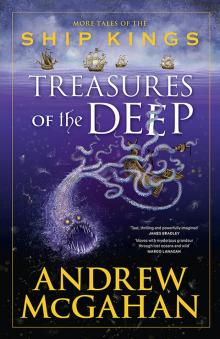 Treasures of the Deep
Treasures of the Deep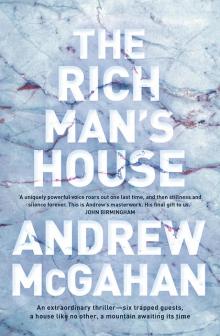 The Rich Man’s House
The Rich Man’s House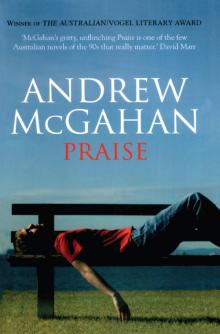 Praise
Praise The White Earth
The White Earth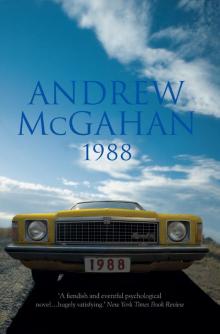 1988
1988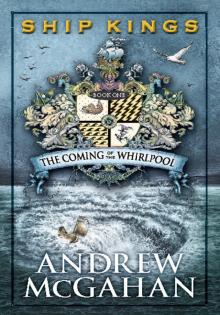 The Coming of the Whirlpool
The Coming of the Whirlpool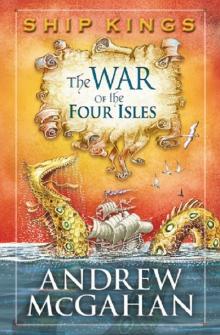 The War of the Four Isles
The War of the Four Isles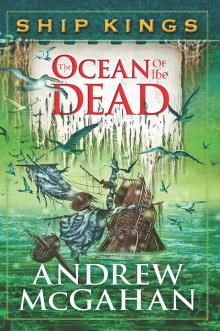 The Ocean of the Dead: Ship Kings 4
The Ocean of the Dead: Ship Kings 4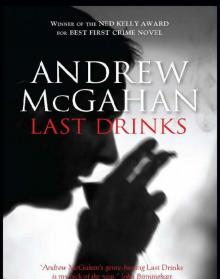 Last Drinks
Last Drinks Wonders of a Godless World
Wonders of a Godless World Underground
Underground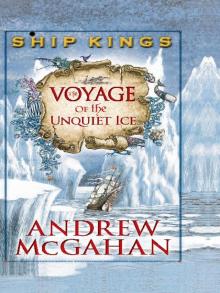 The Voyage of the Unquiet Ice
The Voyage of the Unquiet Ice